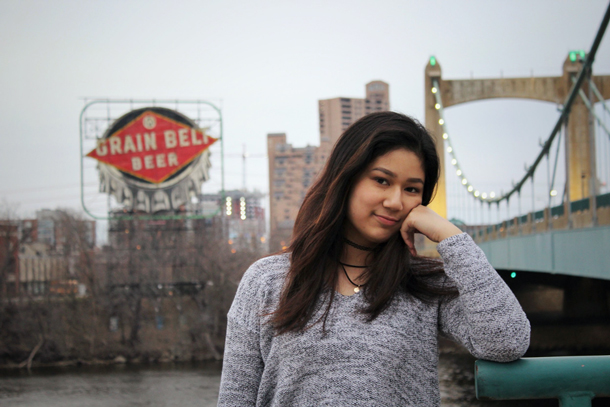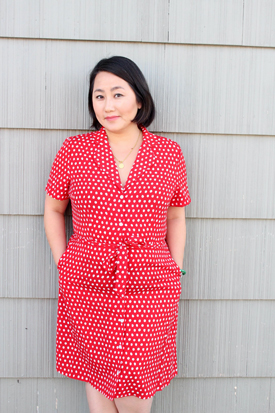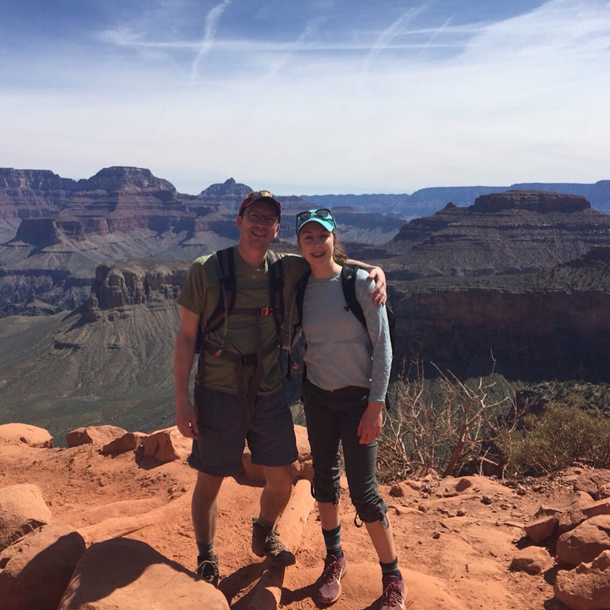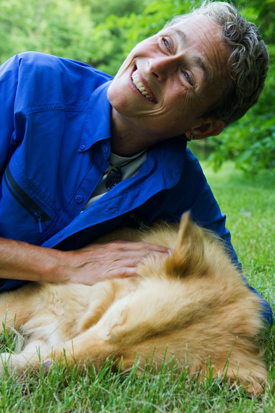Stories and Poetry for Earth Day
Air Date: Week of April 24, 2020

Liz Lat is a Minneapolis based student and writer. She is a Program intern at Climate Generation and a contributing writer to the 2020 Eyewitness: Storytelling Slam. (Photo: Courtesy of Liz Lat)
Each person has a unique story to tell about what Earth Day and environmental protection means to them. Writers and activists share their poems and stories in this 50th anniversary celebration of our connection to the Earth.
Transcript
CURWOOD: Let’s take some time now to share poems and stories in this 50th-anniversary celebration of our connection to the Earth, and its protection. Writer Kao Kalia Yang brings us her essay “Delivery of My Boys”. Her twin boys are named Peace and Freedom
YANG: In early spring, Freedom and Peace raced each other across the spread of green lawn dotted with yellow plumes of dandelions. Freedom is ahead and Peace follows. They climb up high; they slide down low, they laugh and frolic in the open air. When I reach them, they run into my arms and tell me: we belong to you and to each other. They spread their arms wide and proclaim, we belong to the world. My heart, a mother's heart aches for the world that they belong to, even as it rejoices for a world that will know their laughter and their tears, the feel of their feet, the touch of their hands, the distance they represent between the past and future.
What led me to write this essay was a request to participate in a call for climate awareness, a celebration of Earth Day. I'm Hmong American, I am the descendant of shamans, medicine people, farmers. And so my people and my culture Hij have always had a really close relationship to the land. At the feet of my grandmother, I learned about the power of the plants, the power of the soil, the power of the rain. These are not lessons that I was taught in my American classroom so much. But these are the lessons of my home.

Kao Kalia Yang is a Minnesota based Hmong- American writer and public speaker. Her writing collection includes The Song Poet, and a children’s book titled A Map Into the World. She was a contributing writer and performer for the 2020 Eyewitness: Storytelling Slam Produced by Climate Generation. (Photo: Courtesy of Kao Kalia Yang)
Earth Day is for me a celebration of our ancestors, the people that we come from, and our descendants, you know, the ancestors who will one day be. It is this coming together to give thanks and gratitude for the shelter and the safety of the place and belonging.
I'm a refugee. I come from a world as my father says where the sky fell on us and where the earth threw us off. For a long time, I was a stateless child. But always I've always known I belong first and foremost to the earth and that no citizenship, no nationality could ever take that away from me. That from the moment of my birth, there was a place that I belong to and that place was a bigger world. And I think Earth Day is also a wonderful opportunity to be reminded. We live in a world where skies fall down and the earth itself throws us off, a world teeming with refugees, and that we belong because we belong first and foremost to each other.
LAT: My name is Liz Lat.
I am a first-generation Cambodian American and my parents were refugees. And I grew up with the horror stories of the Cambodian genocide, the Vietnam War, and it's a huge part of my identity. And what I didn't realize was that when they immigrated here to Minnesota, a huge part of their assimilation process was taking in the land. Getting into the culture of Minnesota that is the outdoors. And I just wanted to merge those two stories because I'm a born and raised Minnesotan, myself, and I love the North. I love the Boundary Waters. I love Lake Superior. I'm there every summer so I wanted to fuse, all of that emotion, all of that feeling the memories into one compiled story.
Earth Day is important to me and why I believe it's important for the world. It's because it's the one day we get to celebrate. I feel like, during climate change this climate crisis, we're always fighting and we are protesting, which is what we should do. Absolutely. But we have to remember what's already here.
What’s exiting the oceans, the mountains, the trees, it's home. It's what we live on. It's how we thrive. We are part of this whole connected life system, this web.
No matter how young you are, no matter how much you feel like you don't have a say in things, even educating your peers, educating your family, and just trying to tell stories is a form of protest. And to remember that you don't have to march on the streets if you don't want to. You can write your own story and you can share it. It's that simple.
Once upon a time, there was a daughter who was born in the state of Minnesota, the first generation of Khmer Americans. The spirit of the winter and the adventure of the summer allowed her to thrive throughout her childhood. She lived in a home full of cultural tradition and curiosity. She was taught to love and to be grateful and celebrate who she was since birth.
The great outdoors taught her more about life than the warmth and coziness of the fireplace inside. As a little girl, the heaviest snowstorms sparked a curious fire in her eyes; she was determined to strap on protective armor and build a snow kingdom beneath the pine tree in her backyard. In the summer, she woke up at the crack of dawn from her tent, raced to the docks, tackle box and fishing rod in hand, ready to catch the biggest of them all. It was these experiences, the memories that inspire the daughter to take care of the land she calls home, the home where her parents survived, and thrived.
Hearing the bedtime stories of the times past has driven her compassion to fight for social climate and justice and for the freedom of others. The daughter spends the rest of her life ensuring that no one feels alone, that even though the world feels dark and hopeless, she would be the light for those suffering. The girl spends 100 years spreading love to strangers and never stops using her voice. When she wakes, she marches with hope, and when she sleeps, she dreams of peace.
She stands with the earth she stands with her home.
BACIGALUPI: I’m Kathleen Bacigalupi, I’m a sixteen-year-old and I’m a Minnesota student, a part of YEA! MN, Youth Environmental Activists Minnesota.

YEA! MN activist Kathleen Bacigalupi (right) on a hike with her father. (Photo: Courtesy of Kathleen Bacigalupi)
When I was younger I went to Glacier National Park, and we went on this really beautiful hike and there was this super waterfall. A couple of years later we went back with a larger family group and we went on the same hike and it was very dry. And it kind of was alarming. And then the last few years we’ve had extreme polar vortexes in the winter, which canceled a bunch of schools, and then I got involved with YEA! MN and I started learning more about climate change and its impacts on all different kinds of communities; when we say “frontline communities”, I learned what that is. All of these things kind of made me realize that climate change isn’t just a planet issue, it’s a social justice issue, and I think that’s what got me really excited and motivated to fight for change.
I definitely don’t have a leadership role yet, like I’m not; I don’t consider myself like a face of the movement. But I’m learning that everyone has their own story. And I think this time is a good time for me to figure out how I can use mine, to benefit everyone else and the movement.
CURWOOD: That was Kathleen Bacigalupi, and before her, you heard Liz Lat and Kao Kalia Yang. We’ll close our ode to Earth Day with some free verse from Poet Chris Heeter.

Chris Heeter is a professional speaker, wilderness guide, poet, and founder of the Wild Institute. (Photo: Courtesy of Chris Heeter)
HEETER: This is called, “For the Earth Warriors…”
It used to be that weather was the thing you talked about–
at least in the Midwest–
when there was nothing else to say.
It followed ‘Hello’ and a mumbled ‘How ya doing’
with no expectation of a lengthy reply.
It quickly moved from there to temperatures, wind, or rainfall.
Something you could really sink your teeth into.
It had to do with altered outdoor plans
or rain needed for crops and gardens.
Here in the northland, it was about wind chill
and how the old-timers used to walk to school
in inclement weather without whining.
That sort of thing.
But these days, talk of weather has changed.
What was once unusual has become the norm.
Hurricanes, droughts, high and low temps—
all are off the charts we’ve faithfully kept all these years.
Indeed even habitats have changed.
What once supported moose, for example,
has shifted as temperatures climb
expanding the range of deer
bringing parasites and heat stress.
You know this already…or are quickly catching on.
What are we to do with what we know?
At best we feel a dull ache and concern
other times full-on foreboding.
Most of us channel this into the action of some kind—
at large or at home, we do what we can
and try to do more.
It’s frustrating and terrifying
but there is no temptation to look away.
We feel this in our bones as beings on this planet.
It is a deep inner knowing of something profoundly out of balance.
If this were a pretty poem, it would wrap up now
with something tidy and neat
about how we will find our Weh.
But this is a gritty poem that knows better.
It joins the chorus of millions upon millions
of voices, hearts, and souls
that cry out and will not look away.
So here it is, what I can offer is this…
in your darkest places and times
when your love and actions on behalf of all things Wild
feel not nearly enough,
remember you are not alone.
There are countless like-minded Wild souls here with you
also aware, also not willing to look away.
You can take heart in that.
We are a crafty lot.
And when you need to sigh or cry or fall apart
there are others here to help you pick up the pieces
and begin again. And again.
Until we tilt the circumstances
or die trying.
This beautiful world is worth it.
And you, Earth Warrior, are part of that beauty.
CURWOOD: That’s Chris Heeter with her poem, “For the Earth Warriors…”
Links
About YEA! MN (Youth Environmental Activists Minnesota)
Click here to learn more about Kao Kalia Yang’s work
Click here to listen to bedtime stories of Khmer Americans by Liz Lat
Click here to learn more about The Wild Institute and Chris Heeter
Living on Earth wants to hear from you!
Living on Earth
62 Calef Highway, Suite 212
Lee, NH 03861
Telephone: 617-287-4121
E-mail: comments@loe.org
Newsletter [Click here]
Donate to Living on Earth!
Living on Earth is an independent media program and relies entirely on contributions from listeners and institutions supporting public service. Please donate now to preserve an independent environmental voice.
NewsletterLiving on Earth offers a weekly delivery of the show's rundown to your mailbox. Sign up for our newsletter today!
 Sailors For The Sea: Be the change you want to sea.
Sailors For The Sea: Be the change you want to sea.
 The Grantham Foundation for the Protection of the Environment: Committed to protecting and improving the health of the global environment.
The Grantham Foundation for the Protection of the Environment: Committed to protecting and improving the health of the global environment.
 Contribute to Living on Earth and receive, as our gift to you, an archival print of one of Mark Seth Lender's extraordinary wildlife photographs. Follow the link to see Mark's current collection of photographs.
Contribute to Living on Earth and receive, as our gift to you, an archival print of one of Mark Seth Lender's extraordinary wildlife photographs. Follow the link to see Mark's current collection of photographs.
 Buy a signed copy of Mark Seth Lender's book Smeagull the Seagull & support Living on Earth
Buy a signed copy of Mark Seth Lender's book Smeagull the Seagull & support Living on Earth

